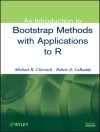A user-friendly, hands-on guide to recognizing and conducting
proper research techniques in data collection
Offering a unique approach to numerical research methods,
Analyzing Quantitative Data: An Introduction for Social
Researchers presents readers with the necessary statistical
applications for carrying out the key phases of conducting and
evaluating a research project. The book guides readers through the
steps of data analysis, from organizing raw data to utilizing
descriptive statistics and tests of significance, drawing valid
conclusions, and writing research reports. The author successfully
provides a presentation that is accessible and hands-on rather than
heavily theoretical, outlining the key quantitative processes and
the use of software to successfully draw valid conclusions from
gathered data.
In its discussion of methods for organizing data, the book
includes suggestions for coding and entry into spreadsheets or
databases while also introducing commonly used descriptive
statistics and clarifying their roles in data analysis. Next,
inferential statistics is explored in-depth with explanations of
and instructions for performing chi-square tests, t-tests, analyses
of variance, correlation and regression analyses, and a number of
advanced statistical procedures. Each chapter contains explanations
of when to use the tests described, relevant formulas, and sample
computations. The book concludes with guidance on extracting
meaningful conclusions from statistical tests and writing research
reports that describe procedures and analyses.
Throughout the book, Statistical Resources for SPSS®
sections provide fundamental instruction for using SPSS® to
obtain the results presented. Where necessary, the author provides
basic theoretical explanations for distributions and background
information regarding formulas. Each chapter concludes with
practice problems, and a related website features derivations of
the book’s formulas along with additional resources for performing
the discussed processes.
Analyzing Quantitative Data is an excellent book for
social sciences courses on data analysis and research methods at
the upper-undergraduate and graduate levels. It also serves as a
valuable reference for applied statisticians and practitioners
working in the fields of education, medicine, business and public
service who analyze, interpret, and evaluate data in their daily
work.
Inhaltsverzeichnis
Preface xiii
Part I. Summarizing Data 1
1. Data Organization 3
1.1 Introduction 3
1.2 Consideration of Variables 4
1.3 Coding 15
1.4 Data Manipulations 18
1.5 Conclusion 20
2. Descriptive Statistics for Categorical Data 33
2.1 Introduction 33
2.2 Frequency Tables 35
2.3 Crosstabulations 37
2.4 Graphs and Charts 45
2.5 Conclusion 50
3. Descriptive Statistics for Continuous Data 63
3.1 Introduction 63
3.2 Frequencies 64
3.3 Measures of Central Tendency 70
3.4 Measures of Dispersion 73
3.5 Standardized Scores 79
3.6 Conclusion 88
Part II. Statistical Tests 101
4. Evaluating Statistical Significance 103
4.1 Introduction 103
4.2 Central Limit Theorem 104
4.3 Statistical Significance 107
4.4 The Roles of Hypotheses 115
4.5 Conclusion 119
5. The Chi-Square Test: Comparing Category Frequencies125
5.1 Introduction 125
5.2 The Chi-Square Distribution 126
5.3 Performing Chi-Square Tests 130
5.4 Post Hoc Testing 143
5.5 Confidence Intervals 146
5.6 Explaining Results of the Chi-Square Test 147
5.7 Conclusion 148
6. The t-Test Comparing Continuous-Variable Data Among Dichotomous Groups 159
6.1 Introduction 159
6.2 The t Distribution 160
6.3 Performing t Tests 161
6.4 Confidence Intervals 172
6.5 Explaining Results of the t Test 173
6.6 Conclusion 174
7. Analysis of Variance: Comparing Continuous-Variable Data Among Nondichotomous Groups 187
7.1 Introduction 187
7.2 The F Distribution 189
7.3 Performing ANOVAs 192
7.4 Post Hoc Testing 214
7.5 Confidence Intervals 217
7.6 Explaining Results of the ANOVA 218
7.7 Conclusion 219
8. Correlation and Regression: Comparing Changes Among Continuous-Variable Scores 231
8.1 Introduction 231
8.2 Bivariate Relationships 233
8.3 Multivariate Relationships 244
8.4 The Phi Coefficient 253
8.5 Explaining Results of Correlation-Regression Analysis255
8.6 Conclusion 258
9. Advanced Statistical Analyses 273
9.1 Introduction 273
9.2 Repeated-Measures Analysis of Variance 274
9.3 Multiple Analysis of Variance 278
9.4 Analysis of Covariance 283
9.5 Discriminant Analysis 286
9.6 Conclusion 290
Part III. Applying Data 303
10. Drawing Conclusions 305
10.1 Introduction 305
10.2 Accepting and Rejecting Hypotheses 306
10.3 Drawing Conclusions from Results 310
10.4 Cautions 315
10.5 Conclusion 323
11. Writing Research Reports 327
11.1 Introduction 327
11.2 Tone 328
11.3 Sections of the Research Report 334
11.4. Conclusion 348
Appendixes 353
Appendix A. Z-Score Table 355
Appendix B. Table for Critical X2 Values 357
Appendix C. Table for Critical t Values 359
Appendix D. Table for Critical F Values 361
References 369
Answers to Review Questions 371
Index 391
Über den Autor
DEBRA WETCHER-HENDRICKS, Ph D, is Associate Professor in the Sociology Department at Moravian College. She has published several journal articles in her areas of research interest, which include quantitative data analysis, interpersonal communications, and gender relations.












